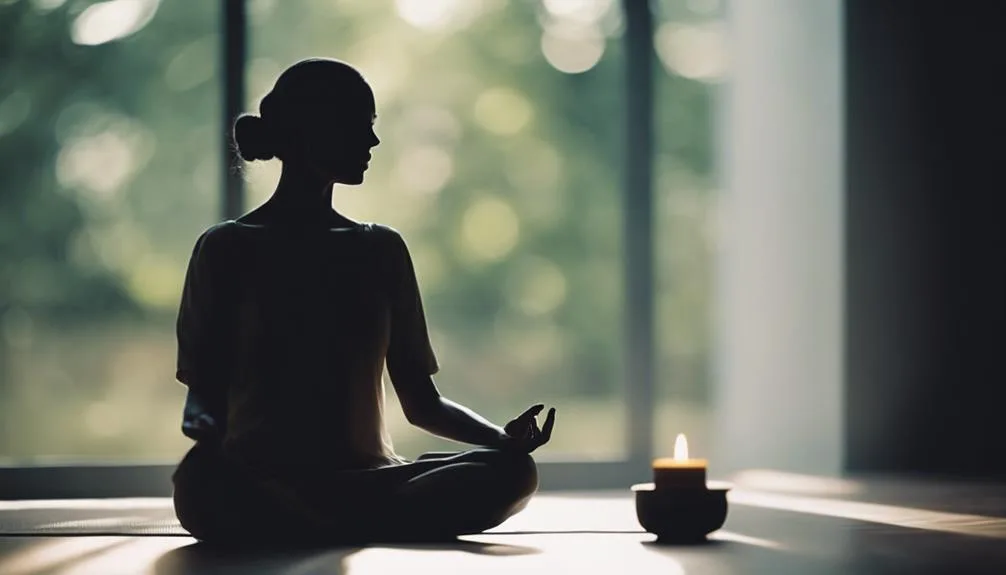You might think that sitting quietly and focusing on your breath could summon a demon at any moment, given the terrifying warnings some have issued about meditation and its supposed link to dark forces.
However, the reality is far less dramatic, though not without its nuances.
As you explore the practice of meditation, it's crucial to navigate the sea of misconceptions and fears, particularly those suggesting a doorway to demonic influences.
Understanding the historical and psychological contexts behind these claims can empower you to safeguard your spiritual journey.
Let's strip away the myths and examine what truly lies beneath the surface.
Key Takeaways
- Meditation offers significant mental and physical health benefits when practiced properly.
- Historical beliefs in demonic influences are rooted in cultural contexts, lacking evidence in meditation practices.
- Proper guidance and mindful practices can mitigate risks and enhance the benefits of meditation.
- Misconceptions about demonic influences in meditation stem from misinterpretation and lack of understanding.
Unveiling Meditation Myths
Despite common misconceptions, meditation isn't inherently demonic or spiritually harmful, offering instead a range of mental and physical health benefits. As an ancient practice rooted in spiritual traditions, meditation has long been a cornerstone of self-improvement and well-being. Originating from ancient Indian cultures, it's deeply embedded in sacred texts and spiritual practices that have been passed down through generations. These traditions emphasize meditation as a path to enlightenment and a method for cultivating inner peace, rather than an opening to negative spiritual influences.
Research consistently shows that meditation can significantly reduce anxiety, enhance focus, and promote a sense of overall well-being. These benefits are grounded in the practice's ability to foster a deeper connection with oneself, encouraging mindfulness and present-moment awareness. By approaching meditation with an open mind and positive intentions, you're not engaging in any form of spiritual harm. Instead, you're participating in a time-honored practice that supports personal growth and mental clarity.
It's essential to understand that meditation, in its essence, is a tool for self-exploration and understanding. By dispelling myths and approaching these ancient practices with respect and discernment, you can unlock their full potential for enhancing your life.
Signs of Negative Spiritual Encounters
As you explore meditation, it's crucial to remain vigilant for signs of negative spiritual encounters. Recognizing unwanted entities, understanding spiritual discomfort symptoms, and knowing how to protect your energy are key aspects to maintaining a safe meditation practice.
An analytical approach to these signs can help you navigate and mitigate potential risks associated with your spiritual journey.
Recognizing Unwanted Entities
Identifying signs of negative spiritual encounters involves recognizing sudden, unexplained changes in one's emotional, physical, or environmental state. When yoga classes, originally published for their true purpose of promoting wellness and inner peace, become sources of discomfort, it's crucial to pay attention to these shifts.
Sudden personality changes, unexplained physical ailments, and persistent negative thoughts signal these encounters. Feeling a sense of heaviness or experiencing disturbing dreams point towards negative spiritual influences. Moreover, unusual smells, unexplained noises, and objects moving on their own indicate the presence of unwanted entities.
Recognizing these signs is the first step in addressing and mitigating their impact, ensuring that spiritual practices remain beneficial, not detrimental, to one's well-being.
Spiritual Discomfort Symptoms
Building on the recognition of unwanted entities, it's critical to understand the specific symptoms of spiritual discomfort that may manifest during meditation sessions. Symptoms such as extreme fear or dread bear significant meaning, indicating a potential negative spiritual encounter.
Physical sensations like sudden chills, unusual smells, or the appearance of unexplained shadows could signal the presence of such entities. Moreover, unusual disruptions in meditation, including sudden loud noises or movements, underscore the significance of recognizing these signs.
Persistent negative thoughts, disturbing dreams, or sudden mood changes post-meditation further emphasize the importance of acknowledging these symptoms. Understanding the meaning and significance behind these signs is crucial for addressing the spiritual discomfort they signify, potentially necessitating guidance from spiritual leaders or cleansing rituals.
Protecting Your Energy
Several signs can indicate a negative spiritual encounter during meditation, including feelings of fear, anxiety, or physical discomfort. Recognizing these signs is crucial for maintaining your mental and spiritual well-being.
To protect your energy and establish spiritual boundaries, consider the following approaches:
- Energy Protection Techniques: Regularly practice aura cleansing rituals and spiritual self-care to shield yourself from negative influences.
- Mindful Meditation Practices: Incorporate positive affirmations into your meditation sessions to foster a protective mental environment.
- Spiritual Boundaries: Be discerning of the energies and entities you invite into your space. Setting clear spiritual boundaries is a proactive step in safeguarding your aura.
Historical Contexts of Demonic Beliefs
Tracing back to ancient civilizations like Mesopotamia and Ancient Egypt, beliefs in demons have deeply influenced various cultural practices and perceptions throughout history. You'll find that these early societies laid the groundwork for how demonic entities were perceived, combining spiritual beliefs with explanations for natural phenomena and personal adversities.
| Civilization | Key Contributions to Demonic Beliefs |
|---|---|
| Mesopotamia | Introduced early concepts of malevolent spirits, shaping the Mesopotamian origins of demonic beliefs. |
| Ancient Egypt | Believed in protective rituals against evil beings, showcasing Ancient Egyptian influences on demonology. |
| Medieval Europe | Saw a surge in witch hunts and exorcisms, highlighting Medieval European beliefs in demonic possession. |
| Reformation Era | Protestant and Catholic movements emphasized the fight against demonic forces. |
| Modern Psychiatry | Offers alternative explanations, challenging traditional views on demonic influences. |
This analysis reveals a historical trajectory where demonic beliefs have evolved from ancient interpretations to complex theological and psychological understandings. Mesopotamian origins, Ancient Egyptian influences, and Medieval European beliefs form a backbone to understanding how these perceptions have shifted over centuries. It's crucial to approach this topic with an analytical and unbiased perspective, recognizing the multifaceted nature of demonic beliefs across different eras.
Psychological Perspectives on Meditation Risks

You must consider the psychological dimensions of meditation, as research highlights mental health concerns including increased anxiety and psychosis in some individuals. Misinterpretation risks emerge when intensive practices lead to altered perceptions and distress, necessitating informed guidance.
It's essential to balance meditation benefits with awareness of its potential psychological impacts, ensuring mental well-being is prioritized.
Mental Health Concerns
Research indicates that while meditation offers numerous benefits, it can also pose significant mental health risks, particularly for individuals with preexisting conditions. As you explore meditation, it's crucial to understand the psychological perspectives on these risks.
- Awareness of Preexisting Conditions: Understand your mental health history, as conditions like depression or PTSD may heighten the risk of negative meditation outcomes.
- Guidance and Support: Seek proper guidance and support to prevent exacerbating any preexisting mental health issues.
- Mindful Practice: Be cautious of excessive or inappropriate meditation practices that could worsen psychiatric symptoms.
Misinterpretation Risks
While meditation offers numerous benefits, misinterpretations of its practices can lead to psychological distress, such as anxiety or dissociation, underscoring the need for proper guidance and understanding.
Identifying misconceptions is crucial; some individuals experience unsettling thoughts or emotions during meditation, potentially misattributing them to demonic influences. This misunderstanding can heighten feelings of unease or spiritual conflict. Lack of proper guidance exacerbates these issues, contributing to a distorted perception of meditation's purpose.
Exploring implications, misconceptions about meditation's effects may amplify fears of demonic interference, affecting one's mental or spiritual well-being. Understanding dangers is essential to address these misunderstandings, preventing unfounded fears and promoting a safe, beneficial practice.
Safeguarding Your Spiritual Journey
To safeguard your spiritual journey, it's crucial to discern and navigate the varied practices and beliefs encountered along the way. Understanding the complexities of spiritual discernment, meditation boundaries, and the importance of setting spiritual safeguards is fundamental. It's vital to approach these practices with a well-informed mindset, acknowledging the potential for demonic deception while also recognizing the power of mindful prayer for spiritual protection.
Here are three key steps to take:
- Exercise Spiritual Discernment: Evaluate meditation practices through a lens of spiritual discernment. Be aware of the intentions behind specific practices like yoga and how they align with your spiritual beliefs.
- Set Clear Meditation Boundaries: Understand and establish clear boundaries for meditation. Avoid practices that encourage emptying the mind entirely, as this can potentially open the door to unwanted spiritual influences.
- Engage in Mindful Prayer: Incorporate mindful prayer into your routine as a form of spiritual protection. Focus on prayers that affirm your faith and values, ensuring that your meditation practices are centered around positive and protective spiritual principles.
Debunking Demonic Influence Misconceptions

Misconceptions about demonic influences in meditation often arise from a lack of understanding and fear rather than factual evidence. It's essential to approach this topic with an analytical and unbiased perspective, clearing misconceptions and debunking fears that surround this practice. You might find it surprising, but there's no empirical evidence to support the claim that engaging in meditation invites demonic entities. Instead, many religious and spiritual traditions view meditation as a vital tool for achieving inner peace and self-reflection, entirely devoid of any demonic associations.
Further, understanding different cultural practices and the historical context of meditation helps in debunking these unfounded fears. Recognizing meditation's role in various traditions emphasizes its importance in spiritual empowerment rather than being a gateway to negative influences. It's crucial to educate oneself and others about the true nature and benefits of meditation, which include numerous mental and physical advantages. By doing so, you'll realize that demonizing meditation based on fears impedes individuals from experiencing its full potential for enhancing well-being.
Let's move beyond these misconceptions and embrace meditation as a source of personal and spiritual growth.
Frequently Asked Questions
How Do Different Religious Traditions Interpret the Relationship Between Meditation and the Potential for Demonic Influence?
Different religious traditions offer diverse interpretations on meditation's benefits and its relationship with spiritual guidance, considering historical origins. They analyze potential risks without universally agreeing on the concept of demonic influences, providing varied spiritual perspectives.
Are There Any Documented Cases or Scientific Studies That Directly Link Meditation Practices to Demonic Possessions or Influences?
You're seeking connections between meditation and negative entities, yet scientific methodologies haven't found evidence linking them. Studies focus on meditation benefits and neurological impacts, offering an analytical, unbiased view on its positive effects on mental health.
How Can Individuals Distinguish Between Psychological Conditions, Such as Dissociative States, and Actual Spiritual or Demonic Encounters During Meditation?
To distinguish between psychological conditions and spiritual encounters during meditation, you'll need mental health awareness. Understanding meditation benefits and exploring clinical therapy options can clarify experiences, ensuring a balanced, informed approach to your spiritual and mental well-being.
What Role Does Cultural Background Play in Shaping One's Perception of Meditation and Its Potential Risks Related to Demonic Influences?
Your cultural background shapes your views on meditation, blending cultural openness with spiritual skepticism. It can debunk meditation myths, distinguishing between genuine practices and misconceived risks, guiding you through informed, personal spiritual or psychological exploration.
You've asked if long-term meditation practitioners have faced negative spiritual shifts. They often implement spiritual safeguards, build personal resilience, and explore meditation alternatives to address these changes, maintaining an analytical and unbiased approach to their experiences.
Conclusion
In navigating the intricate labyrinth of meditation, you've encountered shadows of misconception and flickering lights of truth.
The demonization of such practices often stems from a misinterpretation of their roots and intentions.
Like a ship steering through foggy seas, it's crucial to wield the compass of critical thinking and the map of scholarly inquiry to discern myth from reality.
Safeguarding your spiritual voyage requires understanding, not fear, ensuring that your journey enriches rather than ensnares your soul.

